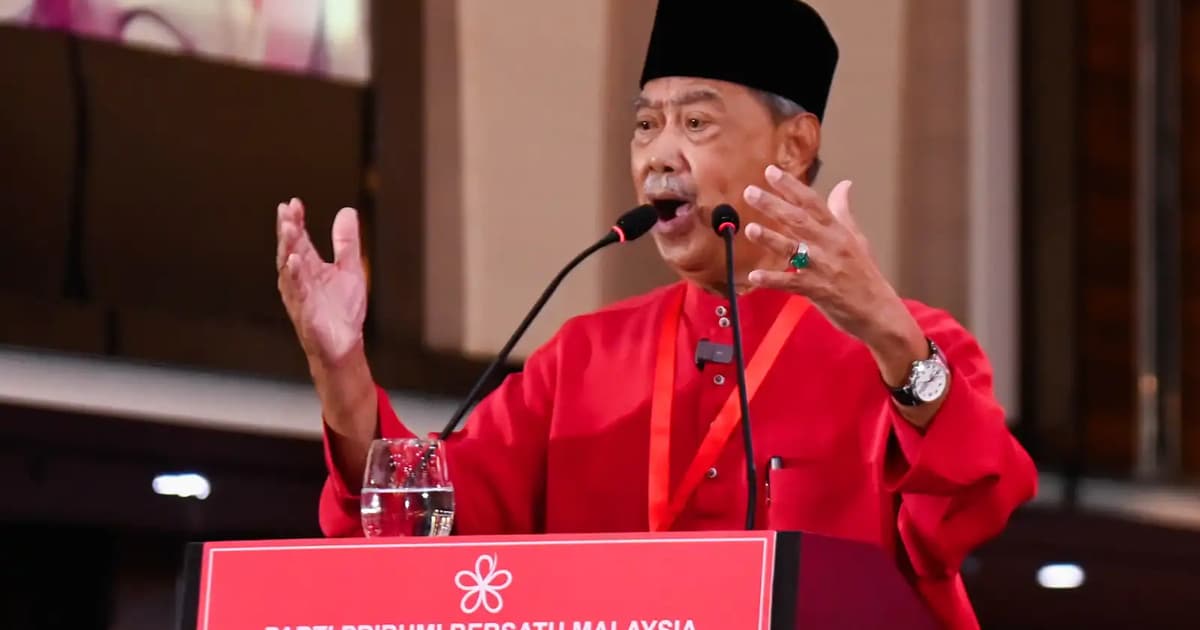
From Danial Asri
When the dust settled at Bersatu’s general assembly last weekend, the party proudly proclaimed a political triumph: the endorsement of Muhyiddin Yassin as the party’s prime ministerial candidate for Perikatan Nasional (PN).
In the hall, this announcement was greeted with fanfare and celebration, as if Bersatu had secured a decisive victory on the way to the next general election.
But in truth, what transpired was less a triumph than a Pyrrhic victory — a victory in name that may ultimately inflict more damage than gain on the coalition’s future. By unilaterally declaring Muhyiddin as PN’s candidate without consultation, Bersatu has exposed itself to criticism, strained coalition ties, and raised old ghosts about its capacity to work as a team player within PN.
A coalition undermined
PAS leaders did not take long to voice their displeasure. As reported in FMT, Kedah menteri besar Sanusi Nor reminded Bersatu to exercise caution, warning against being “ghairah” (over-eager) in announcing decisions of such magnitude without first discussing them with their partners in PN. The rebuke was telling: it was not merely about timing, but about process and respect.
Coalitions are delicate ecosystems. They depend not just on shared goals but on mutual trust as well. Bersatu’s decision to pre-empt consultation sends the opposite signal — that it sees PN as a vehicle to be directed, rather than a partnership to be nurtured.
It risks reducing PN into a one-party show, a repeat of the very mistakes that precipitated previous breakdowns in Malaysia’s fragile political alignments.
The Azmin factor: momentum or miscalculation?
Azmin Ali’s fingerprints are all over this episode. As Bersatu’s secretary-general and long-time strategist, Azmin has been at the forefront of presenting Muhyiddin as “fit and ready” to lead again.
His messaging at the assembly was clear: Muhyiddin remains vigorous, tested, and the natural face of PN.
Yet Azmin’s forceful push carries risks. His history within Malaysian politics — from the Sheraton Move of 2020 to his role in engineering Bersatu’s tactical maneuvres — shows a pattern: bold moves that produce short-term gains but long-term instability.
The Sheraton Move toppled a government but left scars of distrust that linger to this day. The current unilateral declaration risks repeating the cycle: it secures a symbolic win but damages the coalition’s internal chemistry.
For PAS, the Azmin factor is particularly grating. PAS has long prided itself on ideological consistency and grassroots discipline, in contrast to Bersatu’s more transactional, personality-driven politics.
Azmin’s style — assertive, sometimes dismissive — risks widening this cultural rift. The more Azmin consolidates Bersatu around Muhyiddin, the more PAS may feel the need to assert itself as the true anchor of PN.
Lessons from the past: fragility of coalitions
Malaysia’s political history is replete with warnings about unilateralism in coalitions. Umno‘s dominance in Barisan Nasional (BN) eventually sowed resentment among smaller partners. Pakatan Harapan’s (PH) internal fractures — particularly between PKR and its allies — exploded after years of unresolved leadership disputes.
PN was meant to be different: a coalition born out of pragmatism, discipline, and the shared conviction that the government of the day had lost credibility. But discipline without consultation is hollow.
If PAS perceives Bersatu as overreaching, it will not hesitate to push back — whether by proposing its own prime ministerial candidate or by flexing its grassroots strength in the Malay heartlands.
The danger for Bersatu is that this episode cements a perception: that it has learned little from past mistakes, and that it prefers coronations to consensus.
Muhyiddin’s legacy
Muhyiddin himself remains a respected elder statesman within PN. His stewardship during the pandemic and his role in stabilising the coalition are part of his political legacy.
Yet there is fatigue, too. Many Malaysians see his leadership as belonging to a past chapter, not the future.
By prematurely elevating him once more, Bersatu risks tying the coalition’s fortunes to a leader who, while still respected, may not energise younger voters or new constituents.
Worse, it signals an inability to imagine or prepare for leadership renewal — a weakness PAS may quietly exploit by positioning its own rising stars as heirs apparent.
The Pyrrhic veneer of Bersatu’s triumph
In the short term, Bersatu may feel emboldened: it has projected unity, demonstrated loyalty to its president, and reassured its base.
But the long-term costs are clear: coalition goodwill is eroded, PAS feels slighted, and relations may cool further. Internal rifts are ignored — Bersatu’s factionalism remains unresolved, papered over by symbolic loyalty to Muhyiddin.
Worse, future appeal to the younger voters will be limited. By recycling old leadership, PN risks looking stagnant in the eyes of voters.
This is the essence of a Pyrrhic victory: the spoils of the win are outweighed by the damage inflicted. What Bersatu gained in internal applause, it may lose in coalition trust and electoral credibility.
Winning the battle, losing the war
Coalition politics requires patience, humility, and above all, consultation. Bersatu’s hasty “coronation” of Muhyiddin was less a demonstration of strength than of insecurity — a move to shore up internal loyalty but at the expense of external partnership.
If PN is to remain a credible alternative, it cannot afford to stumble into the same traps that doomed previous alliances. Victory without coalition unity is no victory at all.
Bersatu may have won a battle on its own turf, but unless it recalibrates, this “victory” will become its undoing — the very definition of a Pyrrhic victory.
Danial Asri is a Bersatu member and an FMT reader.
The views expressed are those of the writer and do not necessarily reflect those of FMT.






